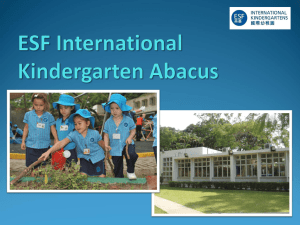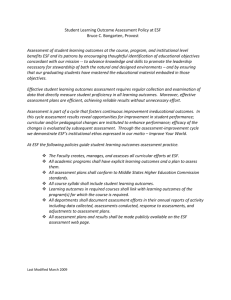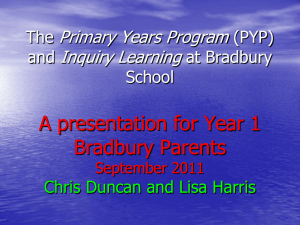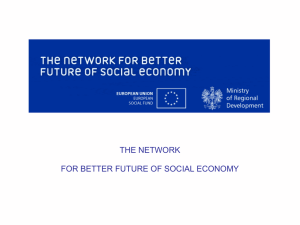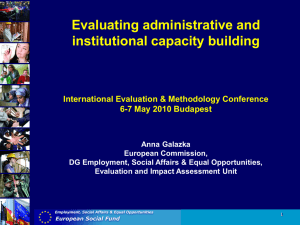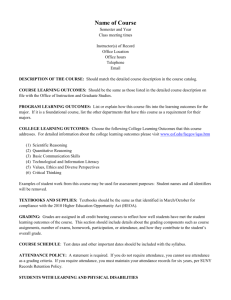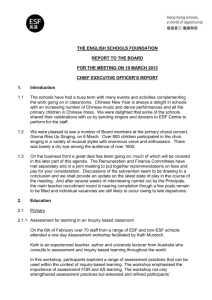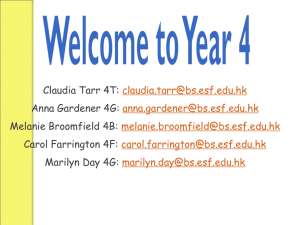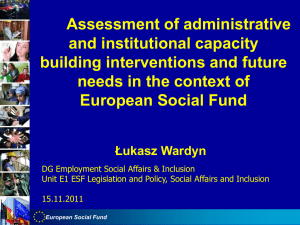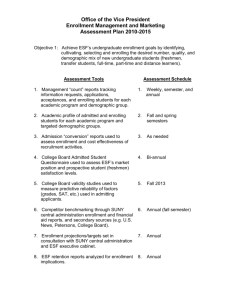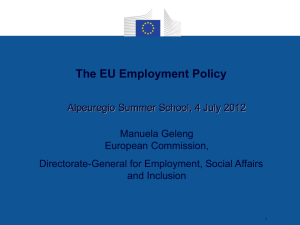Encouraging young minds to be big thinkers.
advertisement
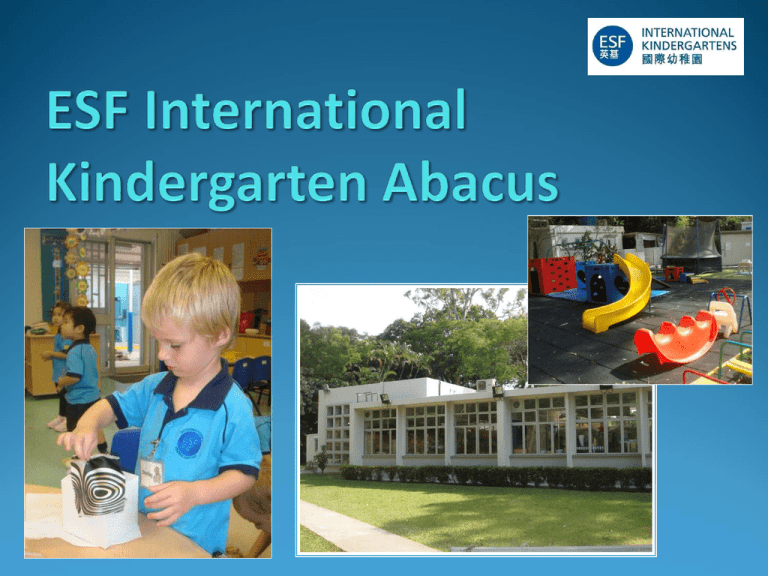
Our Vision and Mission “Encouraging young minds to be big thinkers.” At Abacus we provide a safe and nurturing setting where everyone is encouraged to be unique, respectful and reach their full potential. Our exciting play based curriculum provides children with the opportunity to take risks, inquire and be creative. We provide an individualized programme that develops attitudes and skills. We encourage children to be independent and work together to become lifelong learners. We teach children about their responsibilities to the community and the importance of caring for their environment, its inhabitants and resources. Life for your child at Abacus Our sessions are divided up between indoor class time, snack time and outdoor play. They will have a balance of teacher /EA directed learning, structured play and child chosen play activities. Outside time is planned to maximise learning time. Session times are 8.30-11.30am and 12.30-3.30pm 1 Teacher and 2 Educational Assistants in K1 All teachers speak English as their first language and are degree holders Life for your child at Abacus Follow the IB PYP curriculum in line with ESF Primary schools. Play based using inquiry and designed to develop a range of concepts and skills. We have a no homework and no worksheet philosophy, however we do send home reading books and ideas for play activities you can do with your child each week. Class names – chosen by the children. PYP Curriculum Continuity to ESF Primary and other International Schools Support from CWBS PYP coordinator and ESF teaching and learning advisor Teachers and EAs have all at least MTPYPH received training We have had consultation visit May 2012 and verification visit in May 2013 Personal and Social Making relationships Self confidence Behaviour and self management Personal care Attitudes Developing independence Physical Development Movement Sense of space Health and bodily awareness Using equipment, tools and materials Languages • Oral Language – Listening and Speaking • Linking sounds and letters • Reading • Writing • Visual Language – Viewing and Presenting Chinese Support in class and outdoors Special celebrations Festivals – Mid autumn Chinese new year Dragon boat festival Customs and traditions Chinese vocabulary Chinese stories and songs Science, Technology and Social Studies - Living Things - Earth and Space - Materials and Matter - Forces and Energy - Human Systems - Social Organisation - Human and Natural Environments - Resources and the Environment Mathematics • Number • Measurement • Shape and space • Data Handling • Pattern and Function Arts Art and Crafts Music Dance Imaginative Play Imaginative Storytelling K1 overview Who We Are How We Express Ourselves How We Organise Ourselves How the World Works Play Paint, play, explore We use play to explore, come to new understandings and form new relationships. Through the arts people Transport systems are can use a range of organised to meet the mediums to express needs of a community their feelings and ideas. Food comes from many places and goes through many changes. The ways in which we can play to help us learn The ways in which we can play with our friends The ways in which we can be responsible for our learning environment. The ways in which people express themselves How different mediums can be used in the arts How people respond to the arts Transport The different forms of transport How vehicles are developed to suit their purpose How transport systems are organised to meet the needs of the community Food origins and changes Where food comes from The ways in which humans can use science to manage food waste How common substances interact when they are mixed 5 Essential Elements of the PYP Concepts, Knowledge, Skills, Attitudes, Action—are incorporated into this framework. Concepts – Big Ideas – ‘Animals grow and change’ – concept is Change Knowledge – ‘Caterpillars turn into butterflies’ Skills – Self Management, communication, social, thinking, research Attitudes – Learner Profile and Attitudes – Caring Action – Follow on From their learning Learner Profile Attitudes Inquirers Appreciation Thinkers Confidence Communicators Cooperation Risk-takers Creativity Knowledgeable Principled Caring Open-minded Curiosity Empathy Enthusiasm Independence Integrity Balanced Respect Reflective Tolerance Action Follow up from learning at school Can be child initiated or parent / teacher initiated As simple as reading a book about something they have learned in class, or talking about something they have learned in class. Could also be follow up work such as growing a plant or looking after their own pet at home. Choosing healthy food over sweets after learning about it in school. Sometimes may be charity work / giving pocket money to a cause but doesn’t have to be. Events Trips – Fair – Sports Day – Arts Day – Christmas Carols – Chinese New Year Celebration Differentiation and Inclusion Catering for the needs of all children. Programmes are differentiated for different skill levels. We include children with special needs. Providing children with diverse needs with the support they need is part of our inclusion philosophy. Health Screenings - Voluntary Assessment, Portfolios and Reporting Teachers track children’s progress through their time at kindergarten. Assessment is related to the goals in the curriculum and recorded. It is all informal through observation and discussion. Really important as it helps teachers understand what they need to work on with each child next. Ongoing regular assessment - Use of portfolios Regular reporting to parents: •Term 1 K1– Parents Evening and Report •Mid K1 – Parents Evening •End K1 – Report and Voluntary Parent Meeting The Gateway and Moodle Gateway Calendar, your child’s report, check contact details, book parent conferences, staff emails, assessment and language policies. Moodle Your child’s portfolio, curriculum information, photos, class information. Login details will be sent home at the beginning of the year in your child’s communication book. Partnership with Parents Really important. Weekly information about the curriculum goes home. Parent volunteers welcome either regularly or for special occasions. Communication encouraged via email, or phone to discuss concerns. Diaries. Abacus Parents Group Class Reps Application For Year 1 Primary Most of our children go on to Clearwater Bay School, Renaissance College and other ESF schools. Application in September of K2 Priority Goes To: Siblings and Teachers Nomination Rights ESF Kindergarten Other Children This Year’s Numbers Clear Water Bay School Figures 231 applications for 120 places Siblings and Teachers 72 Nomination Rights 8 ESF Kindergarten 56 Other Children 69 Siblings, NR and ESF Kindergarten 72+8+56 = 136, so 16 of our children were interviewed for the active waiting list and no children from other kindergartens were interviewed initially unless siblings or NR. Eventually all of our waitlisted children did get into CWBS that except those that failed the interview. Coming to ESF Kindergarten does not guarantee an interview or a place at ESF Primary but it does increase your chances. We still have priority for interview for children entering ESF Kindergartens this year. Interviews All children must go through an interview to gain entrance to ESF Primary. The interview is based on English Language ability. We assess your child’s language capabilities using Wellcomm and will notify you if we are concerned about your child’s language development. Normally children must have attended an ESF kindergarten for a minimum of 2 terms before interviews in order to have the Abacus priority. These interviews take place in the January of each calendar year. Before Starting School Fill in forms and return to school on your child’s play date please. Fill in All About Me Booklet with your child and bring it on the first day of term. Buy Uniform – Details in the parent handbook – Second Hand available from the office. Label Everything. Starting School Staggered Start Date. Adult must stay until teacher and you decide your child is settled enough to leave. Teacher may ask you to wait outside for a while. Don’t Hide or Leave without saying goodbye. Bits and Pieces Healthy Snacks – Snack Boxes / Water Bottles. Toileting. Spare Clothes. Mosquitoes. Sun Hats. Medication. Bits and Pieces Birthdays – No cakes or Sweets Buses / Pick Up / Security Cards Typhoon Arrangements Library Books QUESTIONS Time to ask questions. Thank you for choosing ESF international kindergarten. We all look forward to working in partnership with you to provide the best educational experiences for your child.
